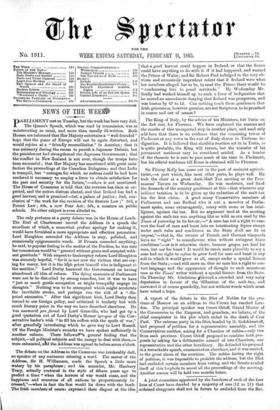The only pretence at a party debate was in the
House of Lords. The Earl of Charlemont moved the Address in a speech the exordium of which, a somewhat profuse apology for making it, would have furnished a more appropriate and effective peroration. Lord Houghton seconded the Address in easy, polished, and occasionally epigrammatic words. If Prussia conceded anything, he said, to popular feeling, in the matter of the Duchies, he was sure her concessions would be " granted without grace and accepted with- out gratitude." With respect to bankruptcy reform Lord Houghton was sincerely hopeful, "for it is not now the victims that are cry- ing for mercy, but it is the high priest himself who is indignant at the sacrifice." Lord Derby bantered the Government on having abandoned all idea of reform. The dying moments of Parliament were not to be disturbed by strong remedies, but it was to have " just as much gentle occupation as might tranquilly .engage its thoughts." Nothing was to be attempted which might accelerate the inevitable stroke, and perhaps run the risk of a " dis- puted succession." After this significant hint, Lord Derby then turned to our foreign policy, and criticized it tenderly but with much literary point in the way we have described elsewhere. He was answered pro forma by Lord Granville, who had got lip a good quotation out of Lord Derby's Homer apropos of the Con- servative leader's wish "to fill his coffers with the spoils of war," after gracefully introducing which he gave way to Lord Russell. Of the Foreign-Minister's remarks we have spoken sufficiently in
another column. There followed general feeling that the subject, — all political subjects and the energy to deal with them,— were exhausted, and the Address was agreed to before seven o'clock.






























